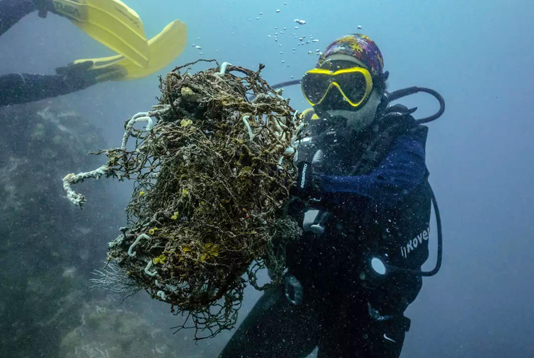CHONBURI, Thailand, Jan 22, 2021 (BSS/AFP) – Underwater divers in plastic-
choked waters off the coast of Thailand snip through discarded nets tangled
around a reef — a new initiative helping protect marine life and aiding the
fight against coronavirus.
The “ghost nets” discarded from the country’s lucrative fishing industry
are a deadly source of plastic pollution, ensnaring turtles and cutting into
delicate coral beds.
Left unattended, “they could stay adrift for decades, either entrapping or
becoming the food of marine animals,” says Ingpat Pakchairatchakul of the
London-based Environmental Justice Foundation.
Ingpat was speaking to AFP during a recent boat trip off the coast of
Chonburi province, as a team of more than 30 divers hacked away at stubborn
threads enveloping a reef 27 metres (90 feet) below the vessel.
She is part of Net Free Seas, a project that fetches used nets and turns
them into new plastic products — in this case meeting the burgeoning demand
for protective gear like face shields to guard against the pandemic.
It aims to prove that protecting sea creatures can be commercially viable
in Thailand, one of the world’s biggest producers of ocean waste.
The initiative also comes in the wake of a growing local outcry over the
lethal effects of plastic on marine life.
In one infamous example, a sick baby dugong named Mariam washed up in
shallow waters two years ago and later died from an infection caused by
plastic lining its stomach.
It prompted an online outpouring of grief among Thais who had spent months
watching a live web broadcast of rescuers trying to nurse the creature back
to health.
Mariam was among the nearly two dozen dead or injured large marine animals
found beached on Thailand’s shores each year, according to Chaturathep
Khowinthawong, the director of the kingdom’s marine park management agency.
“More than 70 percent of them are injured from the ghost nets and have cuts
deep into their bodies,” he says.
“Once they get stuck, the chance of survival is less than 10 percent.”
– ‘We want to save the ocean’ –
Net Free Seas has salvaged 15 tons of waste netting from sea waters in its
first year of operation.
That accounts for a tiny fraction of the 640,000 tonnes of lost and
discarded fishing gear the UN Food and Agriculture Organization says finds
its way into the oceans annually.
But the scheme has met enthusiastic support from local fishing communities.
“It’s a win-win situation,” says Somporn Pantumas, a fisherman in seaside
Rayong city.
“The fishing community gets to have another source of income, the beach and
the sea are clean, and the fishermen find a sense of camaraderie.”
The 59-year-old is one of 700 people in fishing communities across Thailand
selling worn out nets to the scheme.
Somporn was easily convinced to participate, knowing the extent of marine
pollution in the waters off Rayong — he says his nets often collect more
plastic debris than actual fish.
“The more waste I collect from the sea, the more the current sweeps my
way,” he tells AFP.
Collected nets are sent to be washed, shredded, mixed with other discarded
plastics and melted into shape at Qualy Design, a small business that moulds
homewares out of recycled goods.
Qualy is using the nets to make face shields, alcohol spray bottles and
table divider screens used in restaurants around Bangkok since the onset of
the pandemic.
The breakthrough product has been plastic push-sticks, which allow people
to press elevator buttons or public touchscreens like ATM consoles without
risking infection.
Compared to other materials, nets are the hardest to work with and the most
expensive, says the firm’s marketing director Thosphol Suppametheekulwat
tells AFP.
“But we really jumped on it because we want to save the ocean as well,” he
says.



